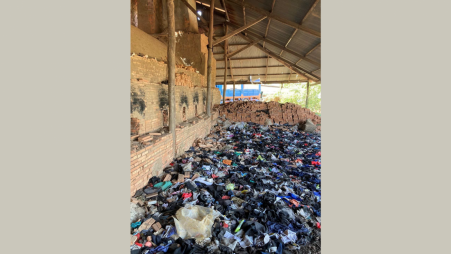Waste from Adidas, Walmart, other brands fuelling Cambodia brick kilns: report
“Several workers reported that burning garment waste caused them headaches and respiratory problems; another worker reported that it made her feel especially unwell during her pregnancies”

Waste from international clothing brands is stored before being used to fuel kilns at a brick factory on the outskirts of Phnom Penh, Cambodia November 17, 2023. Photo REUTERS
Waste from at least 19 international brands including Adidas and Walmart is being used to fuel kilns in brick factories in Cambodia, and some workers were falling ill, according to a report by a local rights group released on Monday.
The report by The Cambodian League for the Promotion and Defense of Human Rights, commonly known by its French acronym LICADHO, was based on visits to 21 brick factories in the Cambodian capital Phnom Penh and neighbouring Kandal province between April and September, as well as interviews with current and former workers.
It found pre-consumer garment waste including fabric, plastic, rubber, and other materials from the brands was being burned at seven factories. The factories were burning garment waste to save on fuel costs, it said.
“Several workers reported that burning garment waste caused them headaches and respiratory problems; another worker reported that it made her feel especially unwell during her pregnancies,” the report said.
Several brands, including Primark and Lidl, said they were investigating the matter.
Burning garment waste can release substances toxic to humans if combustion conditions aren’t carefully managed, and the ashes can also contain high levels of pollutants, according to an internal 2020 study by the U.N. Development Programme which measured emissions from garment factory incinerators in Cambodia that burn garment waste, and which was seen by Reuters.
The report said these toxic substances include dioxins, which can cause cancer. The UNDP did not respond to a request for comment on the report.
A separate report from 2018 by UK academics at Royal Holloway, University of London, said clothing scraps often contain toxic chemicals including chlorine bleach, formaldehyde, and ammonia, as well as heavy metals, PVC, and resins used in the dyeing and printing processes.
Brick factory workers reported regular migraines, nosebleeds, and other illnesses, the UK report said.
The brands named in the LICADHO report are: Adidas, C&A, LPP’s Cropp and Sinsay, Disney, Gap, Old Navy, Athleta, Karbon, Kiabi, Lululemon Athletica, Lidl Stiftung & Co’s Lupilu, Walmart’s No Boundaries, Primark, Reebok, Sweaty Betty, Tilley Endurables, Under Armour, and Venus Fashion.
Adidas, which sources from 16 factories in Cambodia, said it has initiated an investigation to see if waste is being diverted from the authorised disposal routes to the brick kilns.
Adidas environmental policies in Cambodia state that all waste materials from apparel suppliers must be disposed of, either to an approved waste-to-energy plant that is fully regulated and has air quality controls, or to government-licensed recycling centres, the company said.
Lidl said it takes the conditions reported by LICADHO very seriously and that it has started investigations, but could not provide any further information.
LPP said it was unaware its textile waste was being burned in brick kilns, and has contacted its agents responsible for placing orders in Cambodia. LPP said it plans an awareness day in early 2024 for its agents and factories in Cambodia with a particular focus on waste management.
Primark, which sources from 20 factories in Cambodia, said it is investigating the issue. Sweaty Betty did not comment on the specific findings, but said it works closely with suppliers to ensure full compliance with its environmental code of conduct.
C&A said it complies with local laws and regulations and monitors its suppliers through third-party assessments and follow-up visits by its own local staff. It said it immediately investigates any irregularities.
Tilley Endurables said it was “very concerned” with the findings and only works with factories that have passed audits.
Tilley said the factory that produced its items was audited by World Responsible Accredited Production (WRAP), and had committed to ensuring proper waste management based on local laws and internationally recognised standards. Tilley said it further investigated and found the factory uses a Cambodian Ministry of Environment-licensed waste removal company and does not have visibility into what happens to the waste once it is collected.
The other brands did not immediately reply to Reuters’ requests for comment. The WRAP, the Cambodian Ministry of Environment, and waste collection company Sarom Trading Co. Ltd, did not respond to requests for comment.





















